by Debbie Burke

Josie family album
Food can lead to a bountiful banquet of stories.
Not long ago, I enjoyed a week-long visit with an old friend to celebrate her 96th birthday. Josie is Greek and has a well-deserved reputation as a legendary cook. She makes the best baklava I’ve ever tasted. Phyllo, melted butter, honey, cinnamon, phyllo, more butter, chopped nuts, more butter. Layer after layer of pure heaven.
Years ago, one of my relatives was getting married and asked Josie to make Greek food for the wedding. Apprentice volunteers (including myself) spent the weekend in her kitchen and dining room, under the gentle but exacting guidance of our revered goddess of Greek cooking.
Josie showed us how layer baklava and how to stuff grape leaves (dolmades) along with sharing her secret marinating tricks for roast leg of lamb (slivers of garlic embedded all over the meat along with spices and olive oil).
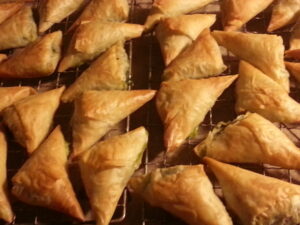
Spanakopita – Photo credit: terri_bateman, CC0, via Wikimedia Commons
The most labor-intensive dish was spanakopita. Phyllo dough is filled with cheese, spinach, and egg then folded flag-style into triangular pastries, brushed with melted butter, and baked. Each one takes about five minutes to carefully fold, but only five seconds to melt in your mouth.
Phyllo is more delicate than 3000-year-old parchment scrolls. When the tissue-thin dough tore as I handled it, that ruined the perfect appearance required for the fancy party. Of course, I had to eat my mistakes and, wow, did I goof up a lot!
The Greek food at the wedding was a huge hit. Prior to this cooking marathon, Josie and I had been friends, but that weekend sealed our close bond forever.
During my recent visit for Josie’s birthday, we went through her dresser drawerful of old recipes. Some were in cookbooks with many margin notes added in ink; others were on paper or index cards in her neat, careful handwriting. The pages were stained with butter, olive oil, chocolate, and other evidence of intense use.
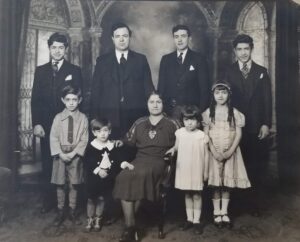
Josie’s family album. She is the girl on the right.
I learned her mother was a first-generation immigrant from the island of Patmos who didn’t know how to read or write. She was a wonderful cook but never used measuring cups or spoons. Memorializing her mother’s recipes in writing took considerable time, experimentation, and guesswork. The effort was worth it.
Fascinating historical tidbits came out in our conversations over the recipes. “During wartime, when there was no food, Greeks didn’t starve like other countries because they ate greens. They went out in the country and picked wild greens. And that kept them from starving.”
Josie recalled picking dandelions to eat in the spring when she was a child. “I wasn’t crazy about them, but my mother insisted.”
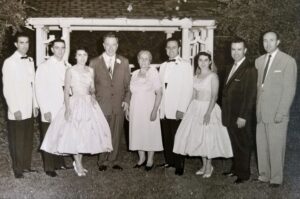
Josie’s family as adults
Her family consisted of five boisterous boys and two girls. “Growing up with five brothers, I learned to hold my own. I wasn’t easily intimidated.”
Seven kids kept their parents busy trying to feed them during Prohibition and the Depression. Her father, whom she called the “original Nick the Greek,” made ouzo in a still in their basement.

Josie’s dad, Nick the Greek
Nick was an early pioneer of route sales. Every day, he walked around their neighborhood, pushing Josie in a baby carriage. He stopped to chat with friends who admired Nick’s adorable toddler in the carriage. After a few minutes of visiting, each walked away with a bottle of ouzo that had been hidden in her blankets.
She also recalled men coming to their house in the middle of the night. Nick always welcomed them. They joked and chatted for a while, then left.
“Why do those men come here so late?” Josie asked her mother.
“Never mind, they’re just visiting.”
She later figured out they were Nick’s satisfied midnight customers.
When she taught her father how to sign his name, he was very proud of that accomplishment.
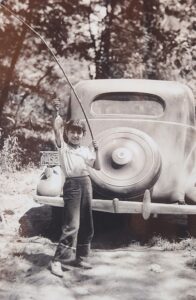
Josie caught a fish for dinner
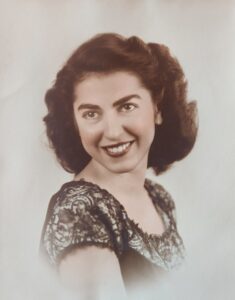
Josie high school graduation photo 1945
Our conversation turned to her early jobs. At 18, she moved from Pennsylvania to Brooklyn. There, she managed a coffee store on Smith Street near Flatbush Avenue. The owner liked her because her accounts always balanced to the penny…except for one problem customer.
A man came in every morning and stole a newspaper. He was a big guy and evidently hid the paper under his arm. She could never catch him in the act, but she knew his habits. After stealing the paper, he would walk around the corner and have breakfast at a cafe.

Flatbush Avenue
Photo credit: Wikimedia.com
One day, she followed him to the cafe and sat down at the counter on the stool beside him. While waiting for their breakfast orders, she engaged him in friendly conversation. She kept pleasantly chatting as he grew visibly more nervous. Finally, she said, “You know, it’s hard for small businesses to survive. Even losing a single newspaper makes a difference.”
“All right! All right! I did it!” the man blurted out. “I’ll pay!”
Her gentle, non-accusatory appeal to his conscience worked. From that day forward, he always paid.
The young woman working alone in a store could have made a tempting target. But Josie received protection from two unlikely bodyguards.
Lou was a burly Italian bookie operating in the neighborhood who made sure no one bothered her. Once, she fell seriously ill with the flu. Lou took her home to his apartment where his wife nursed her back to health with homemade soup. She slept on their couch until she recovered and was forever grateful for their kindness.
The second bodyguard was a so-called “hobo” who met her bus every morning and walked her to the coffee store. Each night, he walked her from the store to the bus stop. “You don’t need to do this,” she told him. He just smiled and continued to escort her.
One night, he was murdered—knifed in a doorway. When she learned about his death, she was heartbroken. “He was so nice to me and never expected anything in return.”
Another early job was in a mill on the Ohio River. The factory made plating to line soup cans. She worked in the lab, testing tin samples because different soup ingredients required different formulations of tin. Inspectors visited often to check compliance for food safety. Before hearing her story, I thought a soup can was simply a soup can.

Josie’s siblings and in-laws
Here’s a festive meal with Josie’s siblings and in-laws. She’s not in the photo perhaps because she was in the kitchen, refilling platters with more goodies.
Starting with recipes, Josie took me on a week-long journey into the past.
Recipes are like old family Bibles and photo albums, rich with history and memories. I learned fascinating facts and anecdotes that never make it into history books. Yet such rich details add texture, color, and verisimilitude to stories about bygone days. Josie’s stories gave me the itch to dive into historical fiction.
I visited for her birthday but I’m the one who left with a precious gift.
~~~
TKZers: Do you have written family histories, or recordings of oral histories?
Do people and stories from the past inspire your work?
What is your favorite source for historical details?
~~~
Ninety-six-year-old Josie is a fan of the Tawny Lindholm Thriller series but has one criticism: “Honey, I wish you’d add a little more sex!”
I’ll take your suggestion to heart, Josie!

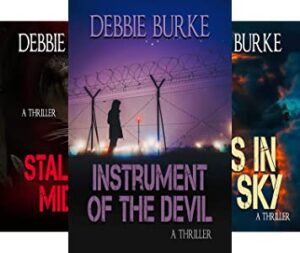
Fabulous recollections, Debbie. Thank you for sharing these tantalizing insights. Yes, experiences growing up shape stories and have made their way into my fiction, and sometimes by design and others as creative whims.
Thanks, Grant. Seeing recipes and photos really brings the past to life, as opposed to dry history books.
Design and whim both are important. Design helps the story structure, whim gives it the zingy spice.
When my Nana passed away the only thing I wanted was her Bible. I remember it being notated and crammed full of clippings. Unfortunately no one could find it! I always wonder what family treasures were lost.
Oh, Warren, what a loss. What if you wrote about the clippings and tidbits you remembered were in there? Not like the real thing, but maybe that would trigger more recollection.
Cousins on my mom’s side of the family have an online group and share all sorts of history, pictures, births, deaths, awards, etc. They’re scattered all over the world now, so this is a nice way to keep in touch, even if I haven’t met many of them.
My mom, after 60 years of being in this country decided she was “ready” to go back to where she grew up and invited me, my husband, and son to join her and my dad. Given the circumstances when she left, it was a bittersweet trip.
How incredibly cool that your cousins are archivists, Terry. Not many families do that anymore. If you ever decide to write historicals, you have your own research library.
Thank you so much for sharing this wonderful story. This was a very uplifting way to start my day–especially the parts you shared about people who stepped in to help Josie at certain times in her life. That is the potential we all have and I’d love to see us all embrace THAT instead of the “how can I stick it to them” attitude that seems front and center in the headlines all the time.
Sadly, I do not have family histories. This has always been a bummer to me because I never knew either set of grandparents – my father’s parents died when he was young, and while *technically* I met my maternal grandparents, I was so little I don’t remember it. That’s why I always tell people to appreciate their grandparents if they’re fortunate enough to have them in their lives.
I never thought about it before but it does make me wonder if deep down that’s part of the reason I’ve always been drawn to writing historical. Plus reading about people and events of the past is just more interesting. It feels like people had a lot more variety in their lives in the by-gone days. They HAD to connect with each other and the land. Truly LIVED experiences. Now what do we do? We check emails and stare at our computer for 16 hours a day. Yep, I’ll take historical times over that any day. LOL!
You’re so welcome, Brenda. Grandparents are incredibly influential. My grandmother taught me to read, told wonderful stories, and planted the seed in me to be a writer.
Great point about LIVED experiences vs. virtual experiences. Back in the day, people had to be more self-reliant and enterprising. They learned how to repair things, instead of tossing them into the landfill.
Meant to add–this weekend while watching a livestream church service on the east coast, they celebrated the 104th!!!! birthday of one of their members who still gardens. She looked spry and could probably run circles around me. Can you imagine the stories she could tell? WOW.
I considered giving up the veg garden this year b/c it’s so much work. The 104-year-old shames me.
Delightful stories, Debbie! Thanks.
I was fortunate to have known and spent time with my maternal grandparents and my paternal grandmother. My father’s father died of a stroke (in his forties) when my dad was about 18. My father wrote his memoirs, and my mother’s younger brother wrote several books about their family growing up. So it is wonderful to have some links to the past.
I am always impressed by the tasks young people took on in those days. And when I am whining and thinking I can’t do some new task, I remind myself of what my ancestors accomplished.
I don’t have a favorite source for historical details, so I am eager to read the sources others use.
Debbie, your stories about Josie are inspiring. I hope you will encourage her to write or verbally record her memories. I see another book for Debbie Burke to write.
You’re welcome, Steve.
How wonderful that your family included writers who recorded their lives.
Yes, kids had to work early to contribute to the family’s survival. That sense of responsibility is lacking today.
No, no more projects! I need to finish the projects you’ve already given me 😉
I have most of the family recipes. Most are hand written. Some are very old clippings. I also have my mother’s cookbooks. The Settlement Cookbook, Love and Knishes (if you have a Jewish grandma cooking for you, chances are the recipie is from Love and Knishes.) And some modern ones.
My children learned to cook with their grandmothers. The older child now teaches challah braiding from time to time. I might need to whip up some meringues this weekend.
Love and Knishes sounds fabulous, Alan.
What time will the challah and meringues be ready this weekend? I’ll be there.
My grandmother never used a recipe. To learn how to make her blintzes, I had her put measured ingredients on the counter, and then measured what was left when she was done. But I still think the secret was in her pan.
She made pancakes from a mix, but never read the back for the instructions.
And there was always a backup chicken in the oven, just in case there wasn’t enough food. HA!
Grandpa Portman’s recollections of life in St. Louis around 1910 are archived here: https://ketcstlstoriesjewishamericans.wordpress.com/2008/04/10/david-t-portman-part-i/
Cousin Henry’s oral history is much different. It is here: https://collections.ushmm.org/search/catalog/vha15549 When I hear MAGAhats start talking about ‘proving immigration status’ Henry’s Papers have a large J stamped over the forged Catholic entry.
Debbie, I love this post! Maybe because I’ve always loved history.
I have many written-down mementos of my family history. For instance, I have the original marriage certificate of my maternal grandparents, of all things.
I have my mom’s recipe tin, each recipe written on a 3×5 card in her own hand.
But, my most cherished possessions are Bibles belonging to my grandmothers, my mom, and my younger brother and sister, all passed away. In the Bibles, there are handwritten notes and scraps of paper they wrote on, plus notes that others wrote to them and they wanted to keep. To me, these are priceless.
Thanks for sharing your stories of Josie and her family.
What a treasure you have, Deb. Original documents are fascinating–written by hand instead of a cold computer printer.
After one grandmother died, in her records, we found three different birth certificates in three different names with three different birthdates. Talk about reinventing oneself. Someday I’ll write that story.
My favorite family story has become timely again. My mother’s father owned a large scrap yard. Some men came to him in 1947-48 to ship some boxes for them. Grandpa was already shipping US Army surplus equipment to the Jewish army in Palestine. Mostly beds, and medical supplies.
The boxes were marked ‘Farm Equipment.’ The men were what were called at the time Palestinian Terrorists. The Palestinians were Jewish in the 1940’s, It would be another 40 years before Palestinian referred to Muslims.
The boxes had a pair of P-51 fighters in them. They were to join the soon to be formed Israeli Air Force. While they overnighted in Grandpa’s yard, someone set fire to them. Grandpa yelled for his crew to put out the fire on the planes, not crates, exposing the plot. My mother always thought local antisemites set the fire. Maybe they did.
Mom got a copy of her father’s FBI file. The secret plan wasn’t very secret. The FBI knew what was in the boxes and their route across the country. Mom still thinks local antisemites set the fire. The FBI has suspects. Their names are redacted in the 50+ year old FBI file I have.
Wow, Alan, that truly makes history come alive and shows how relevant it still is.
Fantastic post about an amazing woman, Debbie. Josie is living a life very well lived with such a rich history. Thank you for sharing it. I’m so glad she is your friend.
My own family history is absent on my dad’s side after going back a handful of generations. His father died young, while his mother’s family immigrated from Sweden in the 1870s, by way of New Orleans. I do have a copy of a Missouri land grant to my grandmother’s uncle from 1876, signed by President Grant.
My maternal grand father is a different story. I have a little genealogical chapbook which shows the history of the Simmonds, going back to 15th Century England. I have great-x-times grandfather who was Mayor of Winchester in Shakespeare’s time and is buried in the cathedral there. One of his descendants, a great-slightly-less-x-times grandfather of mine immigrated to Massachusetts Colony in 1630 as an officer in the Royal Army. The family lived in Massachusetts until nearly 1900, moving first to Wisconsin, and then, eventually, Seattle.
Hope you have a great week, Debbie!
Amazing and fortunate you have such a complete family history, Dale. Sounds like you have story material farther back in time than the 1980s of Meg’s series!
Have a productive writing week, buddy!
Happy Birthday to Josie! And thank you, Debbie, for sharing her story.
Like Brenda, I have no memory of my grandparents. My paternal grandfather died long before I was born, and the others died when I was so small I have no memory of them. But we had relatives who treated me like a treasured granddaughter, and I am so grateful for them.
Unfortunately, I have very little written documentation from my family history. Another cousin received the family Bible. However, I have the letters my father wrote my mother when they were courting. The letters are tied with a ribbon and sit in a filing cabinet in my closet. I’ve never read them. Somehow, the relationship of two people who are falling in love seems so personal, that I can’t bring myself to intrude on it. Maybe I’ll change my mind one day.
Interesting that you bring up family history today. I received an email yesterday from familysearch.org. I’ve used their resources before to trace back my father’s side of the family tree. They found something about my maternal grandmother that caused me to trace that line back in their database. I discovered both sides of my family had members that came to the U.S. during the Puritan wave between 1620 and 1640. I can trace some parts of the tree back to the U.K. hundreds of years before even that. I think it’s time to do some more research.
Thanks for a fascinating post!
Kay, letters do seem more personal but I suspect your folks wouldn’t mind that their daughter cared about their courtship.
The LDS Church has an extensive Family History Center near me. They are open to anyone, not just LDS. The big library is in Salt Lake City and is well worth a visit if you’re ever there.
We were in the Salt Lake City area a few years ago. We went to visit the Dinosaur National Monument in Utah. (Absolutely fascinating — talk about history!)
While we were there, we visited the LDS facilities, attended a concert, and stopped in at the Family Search facility. They sat with me while we did a search and showed me how to use the database from my home computer. It’s a tremendous resource.
What a fascinating life Josie lived, Debbie. Thanks for sharing.
I have a family bible dating back to the 1700s that lists all the births, marriages, family trees, and deaths. I only knew my maternal grandmother, who died when I was four. But I do recall pulling salt water taffy across her kitchen. Wish I had her recipe.
That Bible is truly a treasure, Sue. Pulling taffy is another great remembrance of bygone days and food.
Like some of the others, I never knew my grandparents. My mom’s parents died when she was ten and she had to quit school to help cook and wash for the older boys who kept the family together.
She didn’t talk much about the family, and now I wish I’d asked more questions.
My mother-in-law talked about the first time she saw a car and how scared all the kids were–they all hid under the porch.
Patricia, it seems we don’t fully appreciate the past until we get older. By then, our closest and best resources have often died.
Your MIL’s story is cute. With some of today’s drivers, hiding under the porch sounds like a wise idea!
Wow, Debbie, that gave me goosebumps. Wonderful to have so much history, and wonderful stories to remember. What a life she’s had, and obviously still firing on all cylinders at 96.
I remember as a child watching my own paternal grandmother down on the floor digging her latest knitting project (yes, where I got my love of the craft) out of a box under her bed to show us. Hope I got her genes, she lived to 102. She was born in Ohio but moved to Iowa, and I remember her saying in amazement, “I came here in a covered wagon, and lived to watch men walk on the moon.”
Justine, what an amazing life your grandmother lived. “I came here in a covered wagon, and lived to watch men walk on the moon.” Hope you live that long and leave behind similar wonderful stories as your legacy.